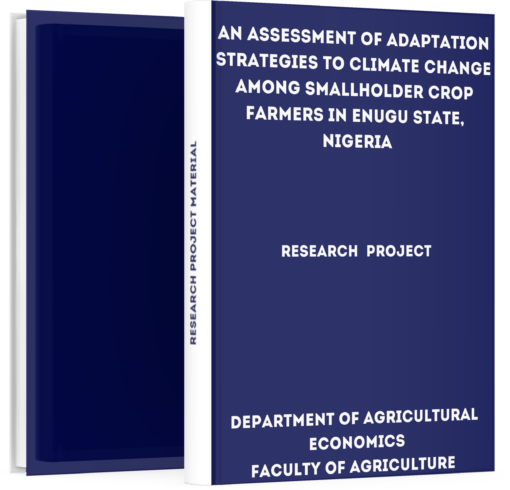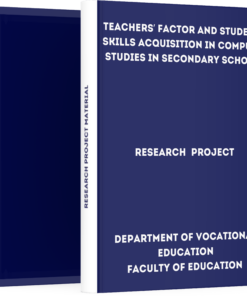An Assessment of Adaptation Strategies to Climate Change among Smallholder Crop Farmers in Enugu State, Nigeria
₦3,000.00
If you are interested in getting this project material “An Assessment of Adaptation Strategies to Climate Change among Smallholder Crop Farmers in Enugu State, Nigeria”, click on the DOWNLOAD BUTTON to make payment and the file will be delivered to your email immediately after confirmation.
Description
– An Assessment of Adaptation Strategies to Climate Change among Smallholder Crop Farmers in Enugu State, Nigeria –
Download An Assessment of Adaptation Strategies to Climate Change among Smallholder Crop Farmers in Enugu State, Nigeria. Students who are writing their projects can get this material to aid their research work.
Abstract
This study was conceived in regard to the empirical reality that farming in Enugu State, as it applies to all parts of Southeastern Nigeria, is constrained by the adverse effects of climate change.
It was therefore, considered necessary to conduct an assessment of smallholder farmers’ awareness to climate change, their adaptation strategies, the associated costs and returns, underpinning, and constraints to their adoption of the identifies adaptation strategies.
This study assessed adaptation strategies to climate change among smallholder crop farmers in Enugu State. Specifically, it described the socio-economic characteristics of the respondents, described farmers’ level of awareness of climate change,
identified climate change adaptation strategies used by the respondents, estimated and compared the costs and returns of these strategies, determined factors that drive the choice of these strategies, and analyzed the constraints to adoption of adaptation strategies.
A multistage random sampling procedure was used to select 320 smallholder crop farmers from 16 communities from whom data were collected in the 2014 farming season using structured questionnaire.
The analytical techniques involving descriptive statistics, cost and return technique, multiple regression model, multinomial logit model, and likert type scale were used in analyzing the data. Majority of the respondents were male (63.7%), average household size of 7 persons and an average farm size of 1.23 hectares in the study area.
Introduction
1.1 Background of the Study
The process of producing food requires resources, which could be natural or manmade. Natural resources include all the materials and forces that are supplied by nature. Those that are most essential for food crop production are land, water, sunshine, air, temperature and soil conditions (which are components of climate system).
Man-made resources (include labour, capital or entrepreneurship) are supplied and influenced by man (Olayide & Heady, 1982; Oyekale, Bolaji & Olowa, 2009).
According to Intergovernmental Panel on Climate Change (IPCC) report (2007), the United Nations Framework Convention on Climate Change (UNFCCC) defined climate change as a change of climate which is attributed directly
or indirectly to human activity that alters the composition of the global and/or regional atmosphere and which is in addition to natural climate variability observed over comparable time periods (IPCC, 2001).
It is obvious from this definition that change is an inherent attribute of climate, which is caused by both human activities (anthropogenic) and natural processes (biogeographical) (Odjugo, 2007, 2009).
Climate change perhaps is the most serious environmental threat facing mankind in the twenty-first century and its complexity has attracted diverse efforts covering the full spectrum of scientific, economic, social and political disciplines.
It is affecting patterns of life and general living conditions of people around the world; the availability of water, food production, weather conditions, health, cultures, economic well-being and recreation among others.
It has already been observed in Africa where it has directly affected climatedependent activities and indirectly worsened poverty, conflict, low level of education and poor health (Orindi & Murray, 2005).
How to Download this Project Material
First, note that we are one of the best and most reliable online platforms because we don’t retain any of your personal information or data as regards making payments online.
PRICE: ₦3,500 ₦3,000 (Three Thousand Naira Only)
Make a bank deposit or mobile transfer of ₦2,000 only to the account given below;
Bank Name: UBA Account Number: 1022564031 Account Name: TMLT PRO SERVICES
After making the payment, CLICK HERE to send the following on WhatsApp;
- Depositor’s Name or Screenshot of Payment
- Name of the Past Question
- Active Email Address
or Call Us On +2348082284439 Once your details have been received and your payment confirmed by us, you will receive the past question in your email or WhatsApp within 5 Minutes.
Guarantee of Getting the Material
We understand that due to the high rate of fraud, many people are afraid of making purchases online but be rest assured that PastExamQuestions will deliver your material after payment.
Once your details have been received and your payment confirmed by us, you will receive the past question in your email or WhatsApp.
Give us Feedback
Have we been able to satisfy you? How well do you think the material will be helpful after having gone through it? Does the price worth the material?
Let’s hear from you! We recommend that our customers give feedback at the end of every transaction to enable us to serve better. You can do this by clicking the review button on this page.
Where is the review button? >> Just scroll up to where you see reviews





Reviews
There are no reviews yet.